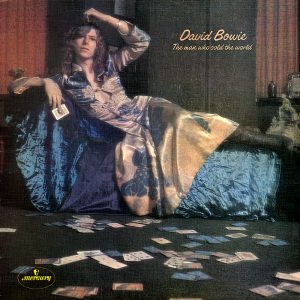In the 70s and 80s, around the time of the second wave, the pop-culture phenomenon of glam rock emerged. In style, this was most easily recognizable by outlandish costumes and overt campiness, often crossing over with androgyny. One of the most popular figures of glam rock was without a doubt David Bowie, famous for his gender-bending fashion.

The Man Who Sold the World, David Bowie’s first breakthrough album, features as cover art (in most versions) Bowie reclining in a long dress; this is only the beginning of a career full of gender-bending, all the way up to his final album.
Even artists in superficially unrelated genres picked up on the popularity of this androgyny: Prince, Boy George, and Freddie Mercury are all examples of this. It is an interesting question why androgyny was so common in pop culture, but in my opinion the most natural answer is merely that it had shock value. In the same way that Bowie, Madonna, even Lindsay Lohan dabbled in Kabbalah for the trendy occultist sheen, androgyny could be used to one’s advantage in appearing uniquely avant-garde.
However, this is not to disparage the use of androgyny in pop music. Even if it was a cynical manipulation of popular tastes, the promotion of androgyny as acceptable (just think of the famous lines “You’ve got your mother in a whirl / She’s not sure if you’re a boy or a girl” from Rebel Rebel) should be taken as an absolute positive.
If it makes sense to argue that popular promotion of androgyny can be good regardless of ulterior motive, it makes sense to ask to what extent such pop music can be considered as feminist poetry. Through exploration of feminine identity, the glam trend naturally has feminist undertones, and music can certainly be interpreted as poetry, so it must be considered as such to some degree. However, I would argue that this argument cannot go very far, as glam undermines its own “purpose” through its celebration of superficiality and vapidity. In other words, how can glam be taken seriously when it makes a point of taking everything too lightly?
